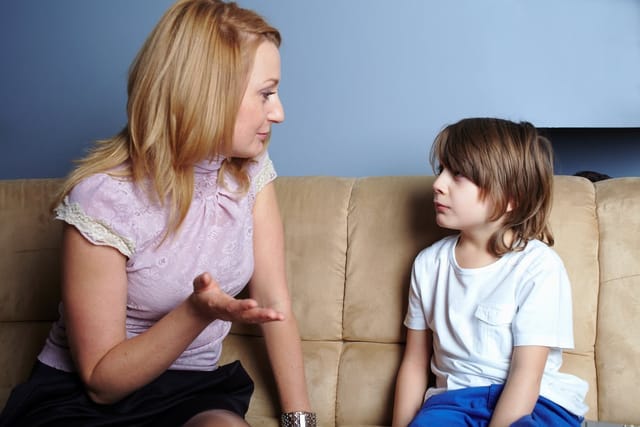Parenting can feel like a delicate balance of supporting one’s kids and disciplining them. It’s not always easy to do both in a positive way, and parents might be guilty of unhealthy behaviors, such as dismissing their children’s emotions or setting too high standards for them to meet. If they’re using any of these 16 phrases, they’re zapping their kids’ self-esteem and making their children view them negatively, which can erode the trust that should be the foundation of their relationship.
1. “Stop being so selfish.”

Although kids can seem selfish, they don’t realize that they’re being self-absorbed. Parents shouldn’t put negative labels on their children because this can make them lack confidence or see themselves as “bad” in their parents’ eyes. It’s not easy to shed those labels, and children might grow up thinking that they’re not a good person or that they’re unworthy of love.
2. “You make me so angry!”

The thing some parents might not realize is that their kids aren’t responsible for their emotions or emotional regulation! It places a huge emotional burden on them to expect them to do this. Telling a child during a heated moment that they’ve made them feel frustrated or angry can be a form of emotional manipulation: the parent is trying to control their kid’s behavior by making them feel guilty or responsible for their emotional state.
3. “Do that and you’ll be grounded forever.”

Making threats doesn’t work with kids because it puts fear in them. The threat, “Misbehave again and you’ll be grounded forever” will also break children’s trust simply because it’s impossible for parents to follow through on it. An older child might know that the parent is being dramatic, which won’t work to make them change their misbehaving ways. However, a younger child might fear that they can be grounded forever, which could make them feel trapped and anxious.
4. “If you don’t stop, I’ll smack you.”

There’s never a good reason for parents to threaten to hurt their children. Even if they don’t follow through on smacking their child, it makes them feel fearful and anxious, both of which you don’t want them to carry forward in life. Parents also shouldn’t normalize violence, as this teaches children that they can use aggression to control others.
5. “Just wait ’til your dad gets home!”

This is another example of a threat, and it might be used by exhausted parents who don’t know how to get through to their kids. So, at their wit’s end, they might call on the kid’s other parent for backup. Telling the child, “Wait until your father/mother gets home!” can damage the trust children have in their parents, because it makes the child feel anxious or scared. It also undermines the parent’s authority, sending the message that they don’t know how to handle the situation.
6. “Tell everyone what you did.”

Naming and shaming children in front of other people to “teach them a lesson” is unfair. To the child, it will feel like an attack on their character. They’ll start to resent and distrust their parents who put them into such hurtful and humiliating situations. It also doesn’t help to discipline them. Requiring them to disclose their misdeeds without offering support can be confusing to them, preventing them from learning from their mistakes.
7. “Why can’t you be like your sister?”

Comparing kids to their siblings is damaging to their sense of self-worth and self-confidence. It makes them feel like they’re inferior and inadequate. It can also lead to feelings of jealousy and envy for one’s siblings, which can damage those relationships. It’s healthier for parents to find opportunities for kids to grow and embrace what makes them unique, instead of stealing their sunshine or dampening their spirit.
8. “Your father is a liar.”

Parents should never trash-talk their partners or ex-partners to their kids. It’s so toxic because it causes the children to stress while making them feel like they have to carry their parents’ emotional drama on their shoulders. They might also feel stuck in the middle of conflict, which they don’t fully understand. As they struggle to reconcile their love for both parents, children might feel confusion and guilt.
9. “If you pass your test, we’ll go on vacation.”

Some parents might make huge promises to their kids that they just can’t follow through on. Although they might mean well when doing this, like thinking it will motivate their kids to excel if they’re expecting a big reward later, it sets kids up for disappointment. It teaches them that they can’t trust what their parents promise or feel excited about things because they’re always lied to.
10. “Keep that to yourself.”

It’s important for kids to feel like they can open up to their parents, even if their thoughts are shameful or embarrassing. If parents tell their kids to keep their thoughts to themselves, they’re teaching them to censor themselves while confirming that their thoughts are “bad.” The children might feel like they have to always hide their thoughts and feelings out of fear of rejection or judgment from others, which is damaging to their self-esteem.
11. “You’re doing it wrong.”
It’s unfair to ask kids to clean the dishes or do the laundry and then criticize their efforts. It’s better to offer support so they can learn in a positive way. If children are constantly told that they’re not doing things correctly, this can cause them to develop a negative self-image and low self-esteem. Constant criticism also strains the parent-child relationship. Children will feel resentful of parents who are overly critical.
12. “You’re fine.”

When a child cries about hurting their foot on the swing in the playground or complains about their friend being mean to them, their parent should avoid brushing off their feelings. Saying something like, “Oh please, you’re fine” only teaches children that they can’t get support from their parents. It invalidates their emotions, which can make them feel belittled and misunderstood. This will just build up tons of frustration and resentment.
13. “You can be anything you want!”

While it’s great to support and encourage kids, parents shouldn’t make them think that they’re invincible or that can achieve whatever they want. This is unrealistic and just sets them up for failure and disappointment later in life. It also puts unnecessary pressure on them to excel, which can lead to negative consequences, such as high levels of stress, anxiety, and perfectionism.
14. “You’re too sensitive.”

Children are trying to learn how to regulate their emotions. It doesn’t help the process if their parents tell them that they’re too “sensitive” about things. Parents who do this miss out on opportunities to grow closer to their children and provide comfort during times of distress. Their children might feel guilty for their feelings and reactions, especially because this phrase reinforces the idea that sensitivity is a negative trait.
15. “Don’t be crazy.”

Parents should never tell their children they’re “crazy” for thinking or doing something. It’s damaging to their self-esteem because it targets their personality, making them think that they’re flawed or something’s seriously wrong with them. Carrying this label around is stressful for kids, as it will negatively shape their worldview and how they perceive themselves and others.
16. “You can’t do that.”

Telling children that they can’t do something can destroy their self-worth and confidence over time. While parents want to be reasonable with them about what they can achieve, they shouldn’t put them down or trash their enthusiasm by always telling them they “can’t.” This negativity breaks down the parent-child relationship, as the child might avoid sharing things with their parent in the future because they never get support.




